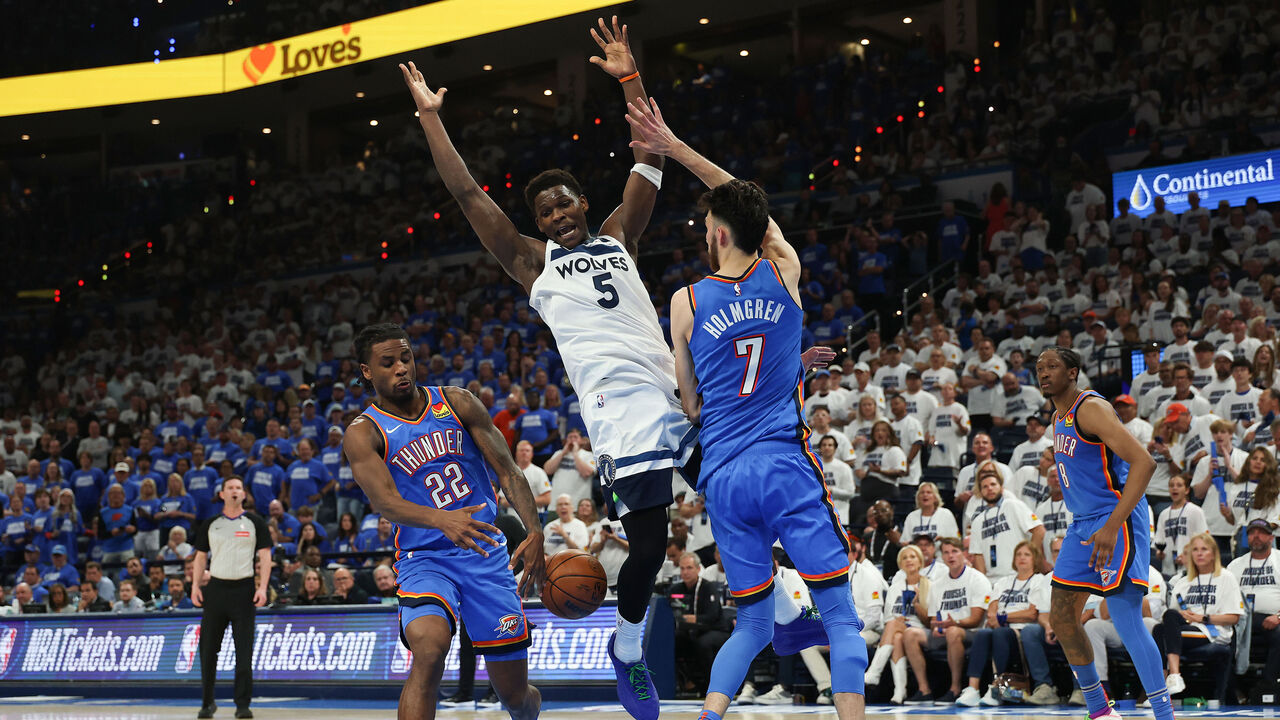The Thunder's defense makes them nearly invincible
Early in the first quarter of Game 5 of the West finals Wednesday, Minnesota Timberwolves forward Julius Randle tried to run a pick-and-roll from the left wing. First, he got a screen from Mike Conley, which did absolutely nothing to dislodge Jalen Williams, the bruising Oklahoma City Thunder wing draped all over Randle. Then Randle got another screen from Rudy Gobert, which succeeded in bumping Williams off but invited an even bigger irritant into the action.
Alex Caruso, the 6-foot-5 Thunder guard who regularly defends centers like Gobert, leapt out and snatched the ball from Randle between dribbles, then took it the other way and pitched it back to Shai Gilgeous-Alexander for a dunk.
A few minutes later, Randle caught the ball on the right wing and tried to attack the middle with his dominant left hand. Caruso, now guarding stretchier big man Naz Reid at the top of the arc, slid down to cut off Randle's driving gap. Randle immediately looked to kick the ball back out to Reid, but Caruso was moving back in that direction before the ball was out of Randle's hands. He picked off the pass and was once again off to the races, drawing free throws at the other end.
Things continued in that vein as OKC rolled to a 33-point halftime lead in its series-clinching victory. Reid tried to post up the smaller Cason Wallace, but Wallace took away his left shoulder, and when Reid tried to spin right, OKC center Isaiah Hartenstein was waiting to rip the ball out of his hands. Shortly thereafter, Reid tried to drive from the top, but Williams swiped the ball away with a strong-side stunt. Later, Conley was pressured by Gilgeous-Alexander along the sideline, tried to reverse course with an escape dribble, and had the ball poked away from behind. Another turnover, another run-out, two more points on the board for the Thunder. It went on and on.
All the while, Wolves superstar Anthony Edwards struggled to find an inch of space while being face-guarded by Lu Dort and seeing waves of bodies the instant he put the ball on the floor. By the time the first-half buzzer sounded, Minnesota had 14 turnovers compared to just 12 made field goals, and OKC led 65-32. The rest was academic. The Thunder cruised to victory and punched their ticket to the NBA Finals, where they await the winner of Pacers-Knicks.
It was a return to form and identity for an all-time great defense that got shredded in both games in Minnesota. The Thunder were demolished in Game 3 and only survived Game 4 because they put forth one of their best offensive showings of the year, with Gilgeous-Alexander and Williams combining for 74 points. Then they came back home and closed things out by doing what they'd done to opponents all year: overwhelming them with ball pressure and physicality, making every decision feel rushed, putting multiple sets of hands in every driving and passing lane, turning the middle of the floor into one big bear trap.

Edwards did all he could in the series, but he ultimately wore down because nobody else on the Wolves could puncture OKC's shell or maintain a live dribble in the middle of the floor. Randle and Reid couldn't find any mismatches to attack. Conley couldn't get anywhere or do anything. Gobert, who isn't the most polished offensive player at the best of times, was such a liability on the short roll that the Wolves had to stop passing him the ball entirely.
Even in a second-round series that didn't feel comfortable until the second half of Game 7, OKC made Nikola Jokic's life miserable and held the Denver Nuggets to a 103.9 offensive rating. That's 15 points per 100 possessions below their regular-season average and the worst mark for any team in the conference semis.
This iteration of the Thunder has never abided by the unwritten rules of NBA defense. Coach Mark Daigneault and his staff know that in this age of unprecedented offensive sophistication and firepower, the worst thing a defense can be is predictable. So OKC changes its help patterns from possession to possession, constantly keeping opponents guessing. Helping off the strong-side corner is supposed to be a no-no, but the Thunder do it all the time. They'll help from anywhere, off of anyone, and then scramble like maniacs to close whatever windows temporarily opened.
They can "have (their) cake and eat it too, in terms of disruption and also discipline," Daigneault told me earlier this season. They're "15 puppets on one string," as Edwards described them after Game 5. This is the Thunder's superpower, their cheat code, the thing that made them one of the most dominant regular-season teams of all time and catapulted them to a Finals in which they'll be heavily favored no matter who comes out of the East.
This is how a team that looked rickety at the offensive end at various points during this playoff run, a team that had ice-cold stretches from 3-point range and crumbled in the face of Denver's 2-3 zone, a team that had tentative moments underscoring its youth and inexperience, still won the West with a plus-11.2 net rating. For now, that's the third-best mark for any Finals team in the play-by-play data era behind only the 2017 Warriors and 2001 Lakers.
Anyone who continues to insist that defense doesn't matter in today's NBA hasn't watched this Thunder team. This is the best defensive unit we've seen in a long time, and it's four wins away from reinforcing the fact that defense still very much wins championships.
Joe Wolfond writes about the NBA for theScore.